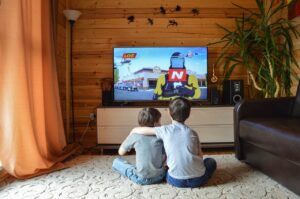“…We now know that “Sesame Street” encourages children to love school only if school is like “Sesame Street.” Which is to say, we now know that “Sesame Street” undermines what the traditional idea of schooling represents.” – Neil Postman
Postman brought up so many great points in this article, Learning in the Age of Television. I find it so fascinating that the ideas he wrote about in 1985 are still very applicable today.
He says that Sesame Street relieved parents of the responsibility of teaching their children how to read and lessened the guilt of leaving their children in front of the TV. (Postman, Learning in the Age of Television)
This brings up thoughts of CoComelon‘s educational nursery rhyme videos on repeat for my nieces and nephews, and Ms Rachel’s Toddler Learning Videos that successfully distract my friends’ toddlers while they prepare meals or tidy up the house. I have always feared that over-exposure to screen time at an early age had links to ADHD and emotional regulation difficulties, but if it’s educational, is it still an issue? Is it the content, or the bright colours, or the sound, or the constant scene changes that is the real problem?
I watched my sister raise her first child with a strict no-screen policy. She took it upon herself to create learning experiences for her child, and I also believe that because of this, my first niece has a lot of patience, a long attention span, and is able to entertain herself with anything readily available. That being said, she may be the exact same child now even with exposure to screen time.

Photo by Vika_Glitter on Pixabay
It’s my own belief that we need to find a balance to everything. If something seems too good to be true, then there is a reason why.
Audio Visual Technology has an important place in education, particularly when it comes to creating meaningful learning experiences. According to the Regeneration Music Project, “The combination of sound and visuals creates a multisensory experience that can evoke emotions, drive engagement, and leave a lasting impression. ”
-
My question to you is, if that we overdo it with the AV Technology, does it minimize these emotions, engagement, and lasting impressions mentioned in the above quote?
-
Should there be a place in education for the more “mundane” tasks, that teach our students to complete things that are not always fun but necessary as they become independent adults?
-
Does the role of AV Technology need to change based on our students? If they have constant access to audio visual technologies, do we need to bridge the gap? Isn’t that the role of schooling in the first place?
This brings me to another conversation that I have recently had with one of my colleagues, a pre-kindergarten teacher at a community school. My school division is running a play-based learning pilot program, and as a middle years teacher, it took me some time to wrap my head around. This colleague of mine made the argument that the role of school has always been to give students the learning that they are not receiving at home; in a time where students are exposed to so much screentime, they are missing out on the socialization and learning that can come from play.
It is possible that because students have constant access to tablets, televisions and smartphones, they find audio visual technology monotonous and dull?
With the implementation of play-based learning, it seems that we are moving away from the heavy use of AV Technology in the classroom. There is, of course, a place for it in education. But that doesn’t mean that it needs to be part of everything we do in the classroom.
It is my belief that Audio Visual Technology is a great way to ENHANCE student learning, but at the end of the day, the skills that we need to teach students so that they can lead happy, successful lives include interpersonal skills, critical thinking skills, and reslilience. This is something that can’t be taught BY screens, but something that needs to come from us as educators.
I would love to hear your thoughts on the overuse of AV Tech in the classroom and play-based learning! Do you think we are going from one extreme to the other? Do you think there is a fine balance?


